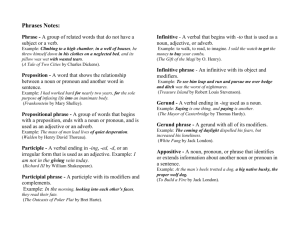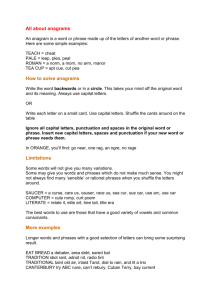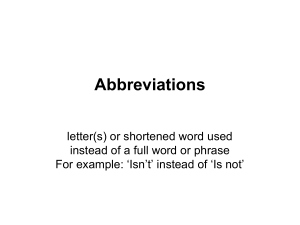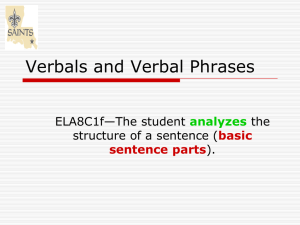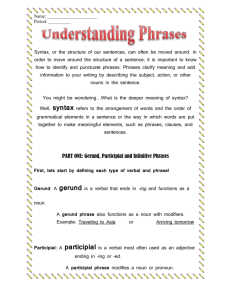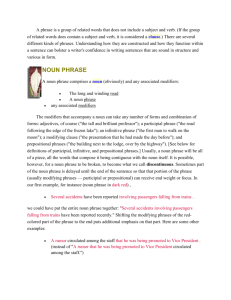Phrases Usually no more than 3 words in length, although that can
advertisement
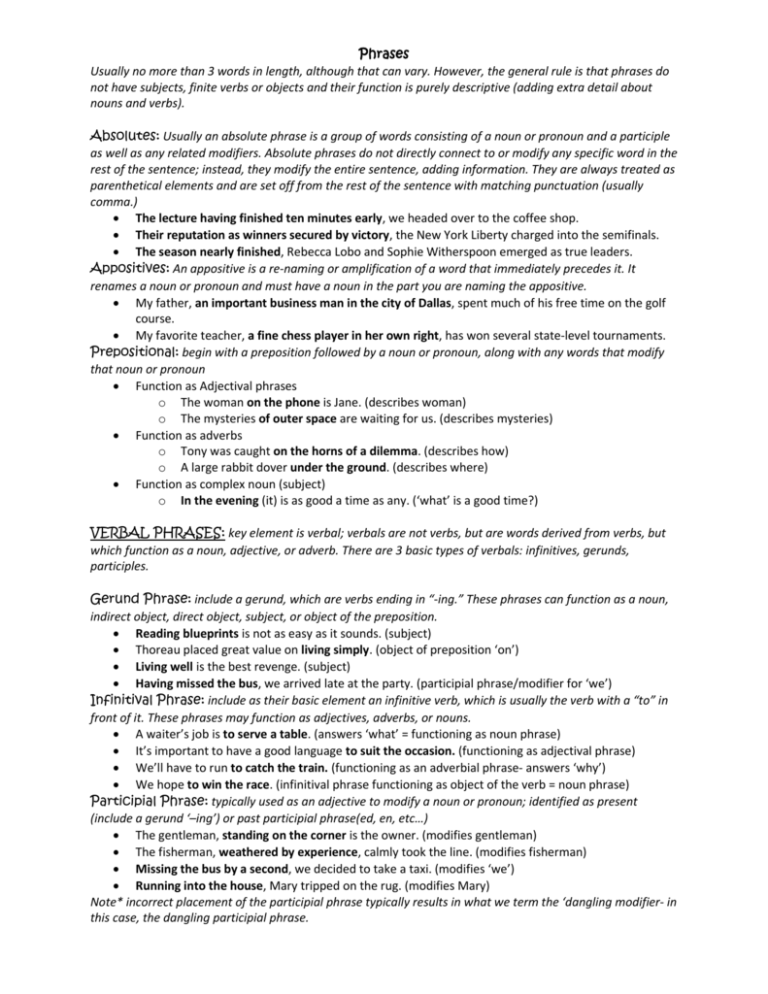
Phrases Usually no more than 3 words in length, although that can vary. However, the general rule is that phrases do not have subjects, finite verbs or objects and their function is purely descriptive (adding extra detail about nouns and verbs). Absolutes: Usually an absolute phrase is a group of words consisting of a noun or pronoun and a participle as well as any related modifiers. Absolute phrases do not directly connect to or modify any specific word in the rest of the sentence; instead, they modify the entire sentence, adding information. They are always treated as parenthetical elements and are set off from the rest of the sentence with matching punctuation (usually comma.) The lecture having finished ten minutes early, we headed over to the coffee shop. Their reputation as winners secured by victory, the New York Liberty charged into the semifinals. The season nearly finished, Rebecca Lobo and Sophie Witherspoon emerged as true leaders. Appositives: An appositive is a re-naming or amplification of a word that immediately precedes it. It renames a noun or pronoun and must have a noun in the part you are naming the appositive. My father, an important business man in the city of Dallas, spent much of his free time on the golf course. My favorite teacher, a fine chess player in her own right, has won several state-level tournaments. Prepositional: begin with a preposition followed by a noun or pronoun, along with any words that modify that noun or pronoun Function as Adjectival phrases o The woman on the phone is Jane. (describes woman) o The mysteries of outer space are waiting for us. (describes mysteries) Function as adverbs o Tony was caught on the horns of a dilemma. (describes how) o A large rabbit dover under the ground. (describes where) Function as complex noun (subject) o In the evening (it) is as good a time as any. (‘what’ is a good time?) VERBAL PHRASES: key element is verbal; verbals are not verbs, but are words derived from verbs, but which function as a noun, adjective, or adverb. There are 3 basic types of verbals: infinitives, gerunds, participles. Gerund Phrase: include a gerund, which are verbs ending in “-ing.” These phrases can function as a noun, indirect object, direct object, subject, or object of the preposition. Reading blueprints is not as easy as it sounds. (subject) Thoreau placed great value on living simply. (object of preposition ‘on’) Living well is the best revenge. (subject) Having missed the bus, we arrived late at the party. (participial phrase/modifier for ‘we’) Infinitival Phrase: include as their basic element an infinitive verb, which is usually the verb with a “to” in front of it. These phrases may function as adjectives, adverbs, or nouns. A waiter’s job is to serve a table. (answers ‘what’ = functioning as noun phrase) It’s important to have a good language to suit the occasion. (functioning as adjectival phrase) We’ll have to run to catch the train. (functioning as an adverbial phrase- answers ‘why’) We hope to win the race. (infinitival phrase functioning as object of the verb = noun phrase) Participial Phrase: typically used as an adjective to modify a noun or pronoun; identified as present (include a gerund ‘–ing’) or past participial phrase(ed, en, etc…) The gentleman, standing on the corner is the owner. (modifies gentleman) The fisherman, weathered by experience, calmly took the line. (modifies fisherman) Missing the bus by a second, we decided to take a taxi. (modifies ‘we’) Running into the house, Mary tripped on the rug. (modifies Mary) Note* incorrect placement of the participial phrase typically results in what we term the ‘dangling modifier- in this case, the dangling participial phrase.
